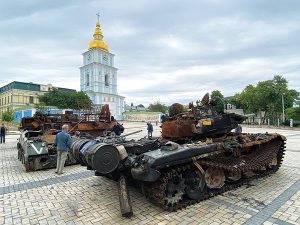Bloomberg
As Russia’s invasion of Ukraine settles into a grinding war of attrition, one question more than any other will likely decide the outcome: On whose side is time?
Much of what unfolds will be determined by unpredictable battlefield dynamics, especially as Russian forces attempt a dash for territory in eastern Ukraine before heavy artillery from the US and elsewhere arrives to bolster the defenses they have to overcome.
US President Joe Biden wrote in the New York Times that he had decided to approve the provision of 80 km (50 mile) range multiple launch rocket systems to Ukraine, the most powerful artillery sent to date.
Yet as time passes, the wider economic and political vulnerabilities — the prospect of fading international support for Ukraine and failing industrial components for Russia — will become at least as important. And given the severity of the war’s impact on the global economy, which side buckles first may be the war’s most important and difficult prediction.
For Ukraine, still out gunned, economically devastated and struggling according to military analysts to integrate a steady stream of recruits, a key risk lies in the durability of the lifeline of fiscal and military support from abroad that’s helped keep in the fight.
Russia in many ways
faces the opposite challenge, struggling to raise fresh troops and starved of imports, including the components needed to produce and replace guided missiles and other weapons lost at the front. As a result, the advantage for Russia on firepower looks set to erode over time.
President Vladimir Putin appears to be counting on international solidarity with Ukraine to fracture first, as economies around the world come under pressure from inflation and food shortages exacerbated by the war, as well as from divergent domestic political and security interests.
“The current state of the global economy shows that our position is right and justified,†Putin said in an address late last month to a forum of the Eurasian Economic Union, a Moscow-dominated alternative to the European Union that includes Armenia, Belarus, Kazakhstan and Kyrgyzstan.
“These advanced economies have not had such inflation for the past 40 years; unemployment is growing, logistics chains are breaking and global crises are growing in such sensitive areas as food,†Putin said. “This is no joke.â€
According to Tatiana Stanovaya, founder of political consultant R.Politik, “Putin’s strategy is to wait this out and he’s absolutely certain that he has plenty of time because he sees the West will soon face major economic problems and popular dissatisfaction will rise.â€
 The Gulf Time Newspaper One of the finest business newspapers in the UAE brought to you by our professional writers and editors.
The Gulf Time Newspaper One of the finest business newspapers in the UAE brought to you by our professional writers and editors.
